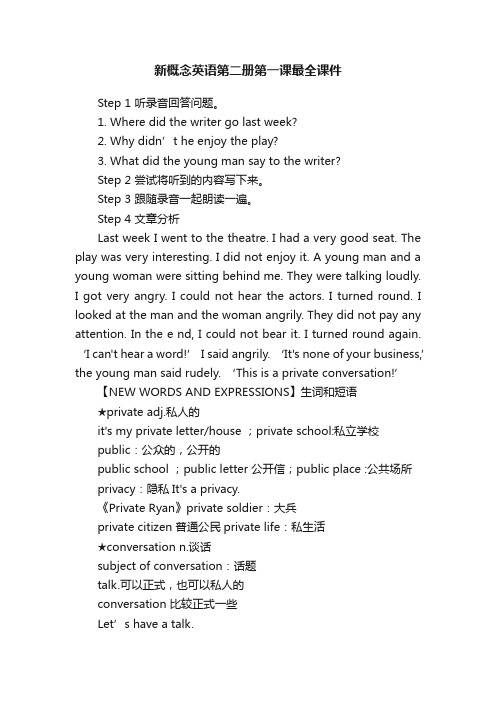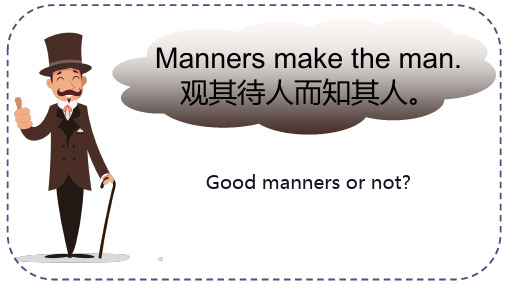新概念英语第二册第一课课文讲解讲课讲稿
新概念第二册第一课课件

• go to +地点:去某地做相关的事 • go to school 去上学; go to church 去做礼拜; • go to hospital 去看病 go home 回家休息 • [注]跟home相连一定表示没有事情可做,休闲
enjoy enjoy oneself 玩得开心 enjoy+sth 喜欢(从中得到一种享受) (后面不能加人) I enjoy the music/book/dinner/film/program.
got 变得 I am/was angry.(是个事实) I got angry.(强调变化过程) got取代be动词。got是半联系动词,可以直接加形 容词。
angrily
3)词尾y变huin+glryily busy---bluucskiillyy easy--easily hheaapvpyil-y--________angry--________
hungry---_________ lucky---
Attention n. 注意
• Attention, please. • pay a little/some/more/no
Thank you !!
Questions on the text
• Where did the writer go last week?
• Why didn’t he enjoy the play?
• What did the young man say to the writer?
新概念二第一课课件Lesson 1 A private conversation

4. seat n.座位 v.安排坐下,使就坐 have a seat/take a seat 就座 (比sit down更有礼貌) have a good seat 有一个好位置 辨析:seat/sit seat只做及物动词,sit可做及物动词也可做 不及物动词 be seated 坐着,坐下;位于
新概念英语 二
welcome
主讲老师:Arthur
新概念英语二
新概念英语第二册共计96课,分4个单元(每24课一 个单元)前两个单元是对新一语法的操练和重现;第三 个单元较难,是一些复合句,第四个单元为复习单元, 每单元有一个综合考试。 新二是我们学习英语的一个过渡,同时也是一个转变。 从一个会说日常英语的人转变成一个敢动笔进行基本写 作的人。以96篇小故事为素材,培养学生听、说、读、 写的基本能力,其优势在于扩充词汇、统揽语法、集合 实践、听说兼修。在掌握第一册基本语法的基础上,由 浅入深逐步讲解语法要点,使学习者轻松掌握枯燥的语 法;通过对句型结构的分析及对短语用法的讲解,使学 习者在真正的听说读写中运用地道的句型。
问题是你想要做什么
二、主语———动词 在这一句型中,动词为不及 物动词及不及物的动词词组。在有的句子中,不 及物动词可以有状语修饰。 1.The sun is rising. 2.I'll try. 3.Did you sleep well?(well做状语,修饰不及物 动词sleep) 4.The engine broke down. 注意:在此句型中, 有少数不及物动词表达被动含义,表达主语本身 所具有的特性,不用被动语态。 1.The book sells well. 2.The window won't shut. 3.The pen writes smoothly.
新概念第二册第一课讲解

lesson1---- A private conversation课文内容:Last week I went to the theatre(see a film,go to the cinema).I had a very good seat. The play was very interesting.I did not enjoy it.A young man and a young woman were sitting behind me.They were talking loudly.I got very angry. I could not hear the actors.I turned round. I looked at the man and the woman angrily.They did not pay any attention.In the end, I could not bear it.I turned round again. ‘I can't hear a word!’I said angrily.‘It's none of your business,’the young man said rudely.‘This is a private conversation!’NEW WORDS AND EXPRESSIONS生词和短语★private adj。
私人的 n。
士兵,列兵(individual, personal)in private 秘密地:非公开地;秘密地或在私下地privacy:隐私 it's a privacy. adj。
privateer (战时特准攻击敌方商船的)武装民船,私掠船拯救大兵瑞恩,private soldier:大兵private citizen普通公民 , private life:私生活it's my private letter/house;private school(私立学校)public:公众的,公开的public school公立学校;public letter公开信;public place公共场所★conversation n。
新概念英语第二册第一课最全课件

新概念英语第二册第一课最全课件Step 1 听录音回答问题。
1. Where did the writer go last week?2. Why didn’t he enjoy the play?3. What did the young man say to the writer?Step 2 尝试将听到的内容写下来。
Step 3 跟随录音一起朗读一遍。
Step 4 文章分析Last week I went to the theatre. I had a very good seat. The play was very interesting. I did not enjoy it. A young man and a young woman were sitting behind me. They were talking loudly.I got very angry. I could not hear the actors. I turned round. I looked at the man and the woman angrily. They did not pay any attention. In the e nd, I could not bear it. I turned round again. ‘I can't hear a word!’ I said angrily. ‘It's none of your business,’ the young man said rudely. ‘This is a private conversation!’【NEW WORDS AND EXPRESSIONS】生词和短语★private adj.私人的it's my private letter/house ;private school:私立学校public:公众的,公开的public school ;public letter 公开信;public place :公共场所privacy:隐私It's a privacy.《Private Ryan》private soldier:大兵private citizen 普通公民private life:私生活★conversation n.谈话subject of conversation:话题talk.可以正式,也可以私人的conversation 比较正式一些Let’s have a talk.They are having a conversation.conversation 用的时候比talk正式,意思上往往不非常正式.talk:可正式可不正式dialogue:对话China and Korea are having a dialogue. 正式chat: 闲聊gossip:嚼舌头have a + talk/chat/dialogue/conversation/gossip 名词变动词★theatre n.剧场,戏剧cinema: 电影院★seat n.座位have a good seat(place)take a seat : 座下来,就座take your seat/take a seatIs the seat taken? 这个座位有人吗?no/yessit Sit down ,pleaseseat Take your seat, please.Be seated, please 更为礼貌seat是及物动词,后面有宾语sit是不及物动词,后面不加宾语seat后面会加人; seat sb; seat him; seat:让某人就座sit he is sitting there.you seat him;〖语法精粹〗When all those present__, he began his lecture.A. sitB. seatC. seatedD. were seatedsit, sit down; seat, be seated; take a seat★play n.戏★loudly adv. 大声的★angry adj. 生气的cross=angry ; I was angry. He was cross. Don't get cross with me, it wasn't my fault. 不要对我生气,那不是我的错。
新概念英语第二册Lesson1完整课件

[v.]
seat
seat sb.
[n.]
让某人就坐
have a very good seat
= a very good place
视线无遮挡,所处的位置非常
好,而非椅子本身材料好。
take one's seat
business
1. 事情(私人的) It's none of my business.
adj. 私人的
private school 私立学校
private letter 私人信件
privacy/ˈprɪvəsi/ n.隐私
public adj. 公众的,公开的 public school 公立学校 public place 公众场所
angry
angry adj. 生气的 be angry with sb. 生某人的气 be angry at/about sth. 为某事而生气
interested adj. 对…感兴趣的 be interested in sth/ doing sth. I am interested in sports.
enjoy v.享受…之乐,欣赏,喜爱 enjoy doing sth. enjoy swimming 喜欢游泳 enjoy one's dinner 饭吃得津津有味 enjoy oneself 玩得开心 =have fun=have a good time
late----late far----far
Listening
Why did the writer complain to the people behind him?
Last week I went to the_t_h__e_a_t_r_e_. I had a very good__s_e_a_t_. The play was very interesting. I did not_e_n__j_o_y it. A young man and a young woman were sitting behind me. They were talking_l_o_u__d_l_y_. I got very__a_n_g__r_y_. I could not hear the actors. I turned round. I looked at the man and the woman_a__n_g__ri_l_y_. They did not pay any_a_t_t_e_n__ti_o__n. In the end, I could not bear it. I turned round again. ‘I can't hear a word!’ I said angrily.
新概念英语第二册第一课教案 (1)PPT课件

an informal talk in which people exchange news, feelings, and thoughts
12
• Theatre:
places to see a film, cinema
• Loudly:
adverb for loud, opposite to low
2
Good manners or not?
• Help the old people.
3
• Pick flowers in the park.
4
• Knock at the door before entering a room
5
• Spit
6
• Jump over the fence
7
• Throw rubbish onto the ground
Lesson 1 A private conversation
By Ariel 14.May,2012
1
Warming up
“Manners make the man.” 观其待人而知其人。 What should we do in public? What can’t we do in public?
13
• Attention: May I have your attention please?
notice
• Bear: I can’t bear it anymore.
to be so upset about something that you feel unable to accept it or let it happen; stand
新概念英语第二册Lesson1课件_PPT

theatre n. 剧院
美音把t发成[d],并加儿化音,结尾re写成er.
seat n. 座位(这个词很重要,考试常考)
have a good seat,这里的seat指place(指地方不错),而不是chair。 take/have a (one’s) seat 请坐 口语电影中常见: Is this seat taken?
5. The play was very interesting , but I didn’t enjoy it. 并列句
6. I couldn’t hear a word. 简单句
7. If you love it, just do it. 复合句 If引导条件状语从句
二、句子的顺序
Birds sing.
privacy n.隐私 (age, salary, marriage, religion) invade one’s privacy 侵犯了某人的隐私
conversation n.谈话
talk n./v. 做名词时,非正式谈话用talk,如let’s have a talk. 而正式会晤talks, 如peace talks 和谈
It’s none of your business.=Mind your own business. one of us/one of the books 其中one是代词 none也是代词,没有人
重点内容回顾: go to the theatre enjoy get very angry turn round pay attention in the end It’s none of your business.
Pay attention to your spelling.稍加注意你的拼写。
新概念英语第二册第一课 课件PPT

新概念英语第二册 第一课
A Private Conversation
主讲人:希城教育高级 英语教师 张文林
音
第
+标 自词 汇源自一 乐 章然拼
读
法
• 1 private
['praivit] a.私人的
• 2 conversation [kɔnvə'seiʃən] n.谈话
• 3 theatre
3. How did the young feel? A.happy B. sad C. angry D. worried
4. The writer looked at _________ angrily. A. her B. him C. them D. they
5. The young man and the young woman paid ________ attention to the writer. A. none B. any C. not any D. no
private conversation!'.
keys to the above exercise:
1.good 2.was 3.it 4.behind 5.got 6.actors 7.angrily 8.any 9.round 10.a
听课文选出最佳答案:
1. Where did the writer go last week?
4. Who got angry at last?
A. The writer B. The young man C. The woman
5. How many times did the writer turn round?
A. one
- 1、下载文档前请自行甄别文档内容的完整性,平台不提供额外的编辑、内容补充、找答案等附加服务。
- 2、"仅部分预览"的文档,不可在线预览部分如存在完整性等问题,可反馈申请退款(可完整预览的文档不适用该条件!)。
- 3、如文档侵犯您的权益,请联系客服反馈,我们会尽快为您处理(人工客服工作时间:9:00-18:30)。
新概念英语第二册第一课课文讲解
新概念英语第二册第一课课文讲解
【课文讲解】 1、Last week I went to the theatre. 动词go的原义是离开一个地方去另一个地方,与介词to连用后,常加上主语所要去的目的来代表主语的动作目的。
go to the +地点表示去某地干嘛 go to the theatre = go to the theatre to see a play去剧场看戏 go to the cinema =see a film 去电影院看电影 go to the dairy 去牛奶店 go to the + 人 + 's 表示去这个人开的店 go to the doctor's 去看病;go to the butcher's 买肉以下短语中名词前不加冠词: go to school 去上学;
go to church 去做礼拜;go to hospital(医院) 去看病;go to bed 上床,睡觉;
go home(跟home相连一定表示没有事情可做,回家休息)
I am at home. 在家休息
2、I had a very good seat.
seat一般指戏院、汽车等配置的固定座位,也可以抽象地表示“座位”或“位子”等概念。
the front seat of a car 汽车的前座 Take a seat, please. 请坐。
3、I did not enjoy it.
enjoy vt. 欣赏,享受,喜爱
① enjoy +n. 喜欢,从当中得到一种享受(后面不能跟人) I enjoy the music. enjoy the dinner/film/program/game ② enjoy oneself/代词玩的开
心 We always enjoy ourselves. ③ enjoy +动名词
Jane doesn’t enjoy swimming. She enjoys going to the theatre.
4、I got very angry.
get在这里有“逐渐变得”的含义,接近become,是个表示过程的动词,表示状态的变化。
而I was very angry则仅表示当时的状态是生气,并不暗示过程。
I am/was angry. 是一个事实 I got angry. 强调变化过程 It is hot. It got hot.
got取代be动词,got是一个半联系动词,可以直接加形容词。
5、I could not hear the actors. I turned round. hear+人:听见某人的话
I could not hear you. Beg your pardon?
I couldn't hear you./I couldn't hear a word./I couldn't catch your words. I couldn't hear you clearly./I couldn't catch your words. Beg your pardon? /I couldn't catch your wor ds. turn round =turn around 转身
6、In the end, I could not bear it.
in the end 最后,终于,表示一段较长的时间之后或某种努力之后
She tried hard to finish her homework by herself. In the end, she had to ask her broth er for help. I could not bear it/you/the noise.
7、I can't hear a word! I can't hear a word. 美音:肯定I can [] 否定,I can't[
],它的/t/是吞进去的, 在读音上很难区别, 只能根据上下文来
定 hear a word of sb. (a word 等于一句话) He didn't say a word.
May I speak to Jim?/May I have a word with Jim?
8、It's none of your business.
one’s business 指某人(所关心的或份内)的事
It's none of your business./None of your business./It's my business. 不关你的
事。
It is my business to look after your health. 我必须照顾你的身体健康。
none
相当于not any或no one,但语气较强。
She kept none of his letters. 他的信件她一封也没有保留。
none of 这个短语有时
可以表达一种断然、甚至粗暴的口气,尤其是在祈使句中: None of your silly
remarks! 别说傻话了!
【Key structures】简单陈述句的语序陈述句一定是有主语,有动词,有宾语,有
句号 6 1 2 3 4 5 6 when? Who? Action
Who? How? Where? When? Which? Which? What? What? 1 ---主语,一般由名词、代词或名词短语构成,通常位于动词之前,动
词必须与主语一致,即主语决定动词的单复数形式 2 ---谓语,由动词充当 3 ---
宾语,一般为名词、代词或名词短语 4 ---副词或介词短语,对方式或状态提问,
往往做状语 I like her very much 5 ---地点状语,一般在方式副词之后,时间副词
之前 6 ---时间状语,可以放在句首或句末简单陈述句一定不能少的是主语, 谓
语. 如果问何时何地,是一个固定搭配 when and where
【Multiple choice questions】 1 The writer turned round. He looked at the man and
the woman angrily ___b___ . a. and they stopped talking b. but they didn't stop
talking c. but they didn't notice him d. but they looked at him rudely "They did not
pay any attention." 不是没看见,只是思想上没在意 pay attention: 从思想上注
意、在意,如交通安全应注意. notice: 眼睛上注意(=see 眼睛看) I notice her. 4
The young man and young woman were sitting behind him. He was sitting ___d___
them. a. before b. above c. ahead of d. in front of behind: 在……后面 in front of 在……前面 (相对静止的概念) before 在……前面 (后面加词或句子,一般和时间相
连) He arrived before six o'clock. before he came back above 在……上面 ahead of 在……前面 (+时间、位置)(动态的行为) ahead of time He goes ahead of me. 5
___c___ did the writer feel? Angry. a. Where b. Why c. How d. When 特殊疑问
词对后面的答案提问 how(adv.)——对一个方式、状态提问,对形容词、副词、
介词短语提问 7 The young man and the young woman paid ___d___ attention to
the writer. a. none b. any c. not any d. no any ——用在否定句和疑问句中some——用在肯定句中 none——代词,没有任何东西、没有任何人 None
knows./None of us knows. not——否定词,要放在非实义动词后面 not any=no He didn't pay attention.。
